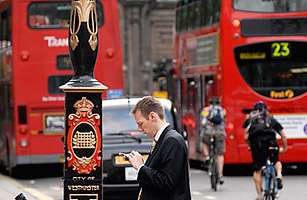
Londoners who want to see how their city is spending money can easily find out
"Sunlight is the best disinfectant," London Mayor Boris Johnson has proclaimed. And to make good on that declaration, he has opened the door to London's data vaults through a website called the London Datastore. Open information, Johnson said, gives rise to "a great army of unpaid scrutineers and invigilators" who help keep city politicians aboveboard. But beyond helping watchdogs, the London Datastore has become the source for other websites that have created opportunities for business development and for reducing London's costs, improving its traffic and generally making life in the city more livable.
The Greater London Authority (GLA) — which directs cross-borough functions like transport, safety, economic development and tourism — operates the initiative. It gets London agencies, civil servants and other contributors to plop data into a public repository. Much of the data is not in a user-friendly format, but webizens quickly transform it into graphs, charts, maps and documents that viewers can understand and slice and dice on PCs and other gadgets. An organization called the Open Knowledge Foundation has created a site called WhereDoesMyMoneyGo.org, and another group, Pushrod Ltd., has built OpenlyLocal.com. Both draw from the Datastore and other sources.
One tangible result: according to OpenlyLocal founder Chris Taggart, some government suppliers had to reduce prices after municipal governing bodies revealed data about contracts. "London is at the forefront of open data, and it seems determined to want to stay there and build a good relationship with its citizens," says Taggart, a digital adviser to the GLA. The open-data scene should get even more rigorous this month, after a U.K. mandate forces all local councils — including those that run London's boroughs — to open up.
Malcolm Barclay, a 35-year-old Web developer who used the Datastore to design and sell a popular bus and underground-rail iPhone app called Travel Deluxe, praises London's decision to release data. "Some authorities see developers as freeloading hackers, but not London," he says.
Among groups releasing information to the Datastore is the London branch of the U.K.'s National Health Service. In December it started posting nonprivate information comparing the performance of London's hospitals in an effort to pressure the underachievers. "NHS London wants to become more open and transparent about how it performs. The aim is to drive up quality," says Dr. Andy Mitchell, NHS London's medical director.
A lot of the Datastore information consists of live updates on traffic congestion, tube operations and locations for London's new bicycle-hire scheme — a city-backed program in which commuters can pick up a bike in one location and drop it off at another. Emer Coleman, the GLA's director of digital projects, who is driving the open-data initiative and is credited by many for making it a success, would like to see the initiative expand to include more information about crime, aboveground trains and many other subjects. One challenge has been to get fearful civil servants to release data. "A lot of our work has been persuading people to become less risk-averse," Coleman says.
Jonathan Raper, CEO of the commercial software developer Placr, says government agencies can have other motives for withholding data, like protecting relationships and proprietary partners. Raper, an adviser to London and a visiting professor at London's City University, is battling to get data from the U.K.'s Association of Train Operating Companies (ATOC), the group that coordinates the many private aboveground-train lines that crisscross the country and often begin or end in London. Placr wants to build and sell a related app, but he says ATOC is resisting.
The Datastore initiative has also faced technical challenges. When GLA first opened live underground-train data last June, a wave of access requests crashed the system; the electronic information boards at tube stations blanked out.
Even hobbyists are building useful apps, effectively helping London tap into a free economy. Matthew Somerville, a 30-year-old Web developer who created an online tube map in a weekend last June and got 250,000 hits within a few days, says commercializing "sounds like too much hard work." Likewise, Ben Barker, a 28-year-old electronics engineer and cycling enthusiast, developed a bike map for "just a bit of fun." It's all a way for London to deliver more for less — by handing over data to people who can make things better and cheaper than those the city might deliver.